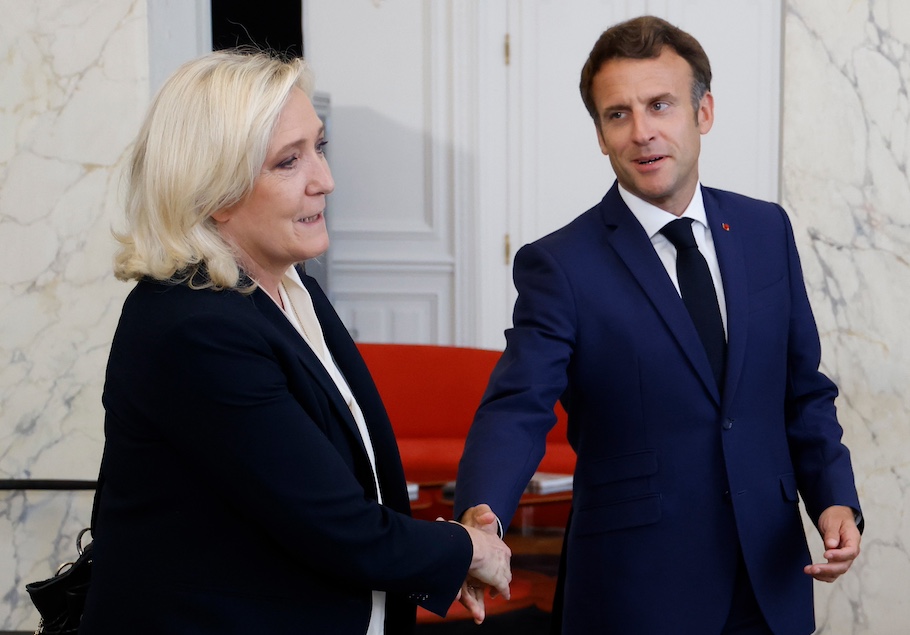In a significant shift in French politics, the far-right party Rassemblement National (RN), led by Marine Le Pen and Jordan Bardella, positioned itself in first place in the first round of the legislative elections on Sunday, according to data published by the French Ministry of the Interior.
The RN garnered just over 33.1 per cent of the votes, surpassing other formations and consolidating its position as a main political force in the country.

Pollster Ipsos projects that Le Pen and her allies from the Republican Party could obtain between 230 and 280 seats, falling short of the majority needed to control the National Assembly.
On the other hand, the centrist Ensemble party of President Emmanuel Macron obtained only a fraction of 21 per cent of the votes, a decline compared to the 2022 legislative elections – although an improvement from the recent European elections where it only achieved 14.6 percent – .
The early voting called by Macron and the dissolution of the National Assembly, following the disastrous performance in the EU elections on June 9, failed to reverse the adverse situation for his party.
Current results suggest that Macron could end up with only 70-100 seats.
Meanwhile, the leftist parties also showed a relatively strong performance.
The New Popular Front, an alliance of the Socialist Party, the Greens, and Jean-Luc Mélenchon‘s France Insoumise, reached 28 per cent of the votes.
According to Ipsos, this coalition could obtain between 125 and 165 seats, dominating the leftist bloc.

This scenario poses a complex political landscape for Macron, who faces a fragmented Parliament and the growing influence of the far-right.
This advance of the right party in the first round underscores the shift in the French political landscape and raises important questions about the future of politics in the country.
Additionally, this result could have significant implications for the electromobility sector in France.
The RN, which has been critical of some of the European Union’s environmental policies, could jeopardize progress in sustainability and the transition to greener mobility.

With the second round on the horizon, all eyes will be on how the parties respond to these results and how power will be reconfigured in the National Assembly, especially in terms of sustainability and electromobility policies.
Gerardo Pérez Gimenez, President of the Alliance of European Car Dealers and Repairers (AECDR), comments: “What happened yesterday in France reflects what is happening in Europe with the so-called far-right parties”.
“At some point, I wonder if it really is far-right because there are a lot of people supporting them. This indicates that there are movements in Europe saying: ‘If you want us to adopt electric vehicles, but we can’t afford it, then you are attacking us,’” he suggests.
What Macron omitted in his electromobility policies
Although France’s push for electric mobility has positive intentions, there are some downsides within the current system of incentives and legislation.
One of the main economic concerns is the unequal benefit of the current incentives.
These could favour people with higher purchasing power who can afford the initial cost of an electric vehicle (EV), even with subsidies.
This could widen the gap between income groups regarding access to cleaner transportation.
Furthermore, the incentives might prioritize the purchase of new electric cars over used ones, potentially neglecting the environmental benefit of extending the lifespan of existing zero-emission cars.
Regarding implementation, limited charging infrastructure is a persistent problem.
Despite Macron’s efforts, the charging network might not expand quickly enough to meet demand. This can discourage potential new buyers, especially those in rural areas or who rely on street parking.
Consequently, as is happening in the most advanced countries in the adoption of sustainable mobility, a large-scale shift to electric cars could also put pressure on the power grid, especially if peak charging times coincide.
France needs to invest in modernizing the grid to support increased demand.
Finally, it could be argued that in the trade war with China, the president escalated the conflict by excluding Asian electric vehicles from the “eco-bonus” subsidy and his constant efforts to keep the Asian giant out of the picture.
The issue is that this could end up affecting the cognac industry, one of the country’s biggest economic drivers, as China, one of its biggest consumers, might impose tariffs on these products.








